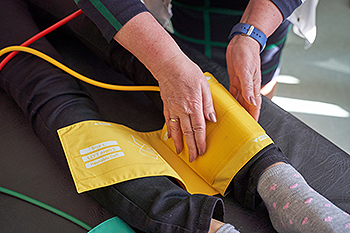Connect With Us
Blog
Items filtered by date: March 2022
Why Are My Feet Tingling?
Peripheral neuropathy causes damage to the nerves outside of the spinal cord and brain, which can result in a host of symptoms, starting in the feet. You may have peripheral neuropathy if you feel tingling or pins and needles in your feet. You may also experience stabbing, shooting, or burning pain in your feet, which tends to be worse in the evening. Your feet may feel numb, weak, or “dead.” They may even be so sensitive that the bed sheets brushing against your feet causes pain. You may have difficulty sensing temperature in your feet, or you may get the sensation of wearing socks even if you are barefoot. In some cases, you may develop ulcers (open wounds) on your feet or legs. While there is no cure for nerve damage, you can help prevent the condition from worsening by keeping blood glucose levels in target range. A podiatrist can also help you keep your feet and legs as healthy as possible and help manage the pain and discomfort caused by peripheral neuropathy.
Peripheral artery disease can pose a serious risk to your health. It can increase the risk of stroke and heart attack. If you have symptoms of peripheral artery disease, consult with our podiatrists from Superior Foot & Ankle Center. Our doctors will assess your condition and provide you with quality foot and ankle treatment.
Peripheral artery disease (PAD) is when arteries are constricted due to plaque (fatty deposits) build-up. This results in less blood flow to the legs and other extremities. The main cause of PAD is atherosclerosis, in which plaque builds up in the arteries.
Symptoms
Symptoms of PAD include:
- Claudication (leg pain from walking)
- Numbness in legs
- Decrease in growth of leg hair and toenails
- Paleness of the skin
- Erectile dysfunction
- Sores and wounds on legs and feet that won’t heal
- Coldness in one leg
It is important to note that a majority of individuals never show any symptoms of PAD.
Diagnosis
While PAD occurs in the legs and arteries, Podiatrists can diagnose PAD. Podiatrists utilize a test called an ankle-brachial index (ABI). An ABI test compares blood pressure in your arm to you ankle to see if any abnormality occurs. Ultrasound and imaging devices may also be used.
Treatment
Fortunately, lifestyle changes such as maintaining a healthy diet, exercising, managing cholesterol and blood sugar levels, and quitting smoking, can all treat PAD. Medications that prevent clots from occurring can be prescribed. Finally, in some cases, surgery may be recommended.
If you have any questions, please feel free to contact our office located in Long Beach, CA . We offer the newest diagnostic and treatment technologies for all your foot care needs.
Archives
Categories
- Featured (164)
- Blog (177)
- Ankle Care (6)
- Ankle Condition (2)
- Ankle Pain (0)
- Appointment Tips (2)
- Arch Pain (1)
- Arthritis (10)
- Athlete's Foot (6)
- Blister (1)
- Bunions (7)
- Calluses (1)
- Child Care (2)
- Circulation (1)
- Common Foot Conditions (4)
- Common Foot Problems (3)
- Corns (0)
- Custom Orthotics (1)
- Diabetes (10)
- Diabetic Foot Care (3)
- Diabetic Footwear (1)
- Edema (1)
- Exercise (4)
- Fall Prevention (1)
- Fitness (1)
- Flat Feet (2)
- Foot Care (19)
- Foot Care Safety Tips (3)
- Foot Care Tips (20)
- Foot Conditions (12)
- Foot Facts (3)
- Foot Health (6)
- Foot Odor (1)
- Foot Pain (5)
- Foot Problems (2)
- Foot Safety (1)
- Foot Surgery Tips (2)
- Foot Warts (2)
- Foot Wear (2)
- Fractures (1)
- Fungal Infection (2)
- General Health (0)
- Gout (5)
- Gout Treatment (0)
- Hammertoe (1)
- Health Tips (46)
- Heart Health (1)
- Heel Pain (0)
- Heel Spurs (0)
- Ingrown Toenails (4)
- Interesting Facts (2)
- Joint Pain (2)
- Leg Conditions (2)
- Leg Condtions (0)
- Men's Foot Health (1)
- Metatarsals (0)
- Nail Fungus (2)
- Neuropathy (1)
- Nutrition (2)
- Obesity (2)
- Osteoporosis (1)
- Pain Relief (5)
- Patient Communications (1)
- Pediatric Foot Conditions (5)
- Pediatric Foot Pain (2)
- Pedicure (1)
- Peripheral Arterial Disease (1)
- Plantar Fasciitis (2)
- Podiatrist Appointment (0)
- Pregnancy Feet (3)
- Proper Shoes (2)
- Senior Foot Care (7)
- Shoe Fit (1)
- Skin Cancer (3)
- Sports Injuries (2)
- Spring Foot Health (1)
- Summer Foot Health (2)
- Toe Pain (4)
- Uncategorized (5)
- Varicose Veins (2)
- Walking (1)
- Women Foot Health (3)
- Youth Sports (2)

